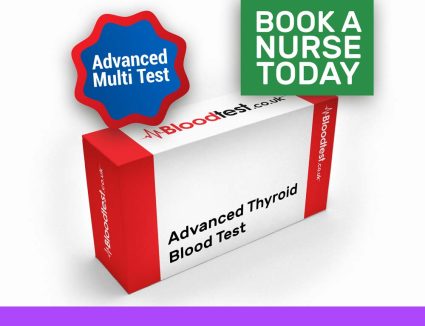Your Comprehensive Guide to Thyroid Blood Tests Available in Leeds
Understanding the Vital Importance of Thyroid Blood Tests

A thyroid blood test in Leeds serves as a critical diagnostic tool for assessing the overall health and operational capacity of your thyroid gland. This butterfly-shaped organ, situated at the front of your neck, produces essential hormones that play a significant role in regulating your metabolism, energy levels, and various other vital bodily functions. By analysing the concentrations of key hormones such as thyroxine (T4), triiodothyronine (T3), and thyroid-stimulating hormone (TSH), medical professionals can effectively evaluate how well your thyroid is fulfilling its essential functions. Any anomalies in these hormone levels may suggest potential thyroid disorders, which may require further assessment and suitable treatment approaches.
Recognising the significance of these hormones is essential for maintaining optimal health. T4, the primary hormone produced by the thyroid, is converted into T3, a more biologically active hormone that directly affects how your body utilises energy. Concurrently, TSH, which is secreted by the pituitary gland, instructs the thyroid to increase hormone production. Deviations from the standard ranges of these crucial hormones can lead to conditions such as hypothyroidism or hyperthyroidism, both of which can profoundly affect your overall health and quality of life.
Regular thyroid blood tests in Leeds are indispensable for diagnosing thyroid dysfunction and are vital in monitoring ongoing thyroid conditions. These assessments enable healthcare providers to evaluate the effectiveness of current treatments, ensuring that you are not solely reliant on symptomatic indicators to assess your health status. Residing in Leeds, where an abundance of healthcare resources is readily available, obtaining this test is paramount for achieving optimal health outcomes.
 Identifying Symptoms That Signal the Need for Thyroid Testing
Identifying Symptoms That Signal the Need for Thyroid Testing
You might be wondering about the specific signs that could suggest the necessity for a thyroid blood test in Leeds. Thyroid dysfunction can present itself through a variety of symptoms, some of which may initially seem subtle. For example, unexplained fluctuations in weight, whether it be unexpected weight gain or loss, can indicate an underlying thyroid issue. Additionally, persistent fatigue that remains despite adequate rest, along with unpredictable mood swings, can also point to potential thyroid problems that warrant further investigation.
To illustrate, if you find yourself gaining weight despite adhering to a consistent diet and exercise regimen, this could suggest hypothyroidism, a condition characterised by inadequate hormone production from the thyroid gland. On the flip side, unforeseen weight loss may signal hyperthyroidism, which is associated with an overactive thyroid. Other symptoms to keep an eye on include fluctuations in heart rate, heightened sensitivity to temperature changes, and even unexpected hair loss.
If you experience a combination of these symptoms, it is advisable to arrange a consultation with your GP concerning a thyroid blood test in Leeds. Early detection and prompt intervention can lead to more effective treatment options, reinstating balance to your thyroid function and significantly enhancing your quality of life.
Essential Guidelines for Preparing Effectively for Your Thyroid Blood Test
Preparing for your thyroid blood test in Leeds may vary depending on the specific recommendations provided by your healthcare professional. Although fasting is generally not necessary for thyroid tests, your GP may advise you to avoid certain medications or supplements that could impact the accuracy of the results. It is crucial to engage in a thorough discussion with your healthcare provider about any medications you are currently taking, as some may affect hormone levels during the testing process.
On the day of your scheduled test, it is advisable to remain calm and relaxed, as anxiety can also influence hormone levels. Mental preparation is just as vital as physical readiness. Be sure to arrive for your appointment well-hydrated, as this can facilitate a smoother experience during blood collection.
Being thoroughly prepared can significantly enhance the accuracy and relevance of your thyroid blood test in Leeds. It equips your healthcare provider with crucial insights to make informed decisions regarding your treatment and overarching health management.
Decoding Your Thyroid Test Results for Improved Health Management

Once you receive the results from your thyroid blood test in Leeds, comprehending their implications for managing your thyroid health effectively is crucial. Reference ranges for TSH, T3, and T4 can slightly differ depending on the laboratory conducting the test. However, a TSH level typically between 0.4 and 4.0 mIU/L is widely regarded as normal. Should your results deviate from these ranges, it may indicate a thyroid disorder requiring further evaluation and analysis.
Your GP will assist you in interpreting your results, clarifying whether your hormone levels suggest conditions like hypothyroidism, hyperthyroidism, or other thyroid-related disorders. If any abnormalities are detected in your hormone levels, your healthcare provider may recommend additional tests to accurately diagnose your condition.
Understanding your results empowers you to take an active role in your health journey. It also facilitates meaningful discussions with your healthcare provider regarding potential treatment options, lifestyle adjustments, or further testing that may be necessary. Always feel free to ask questions throughout this process; your health should always remain the top priority.
Where to Access Comprehensive Thyroid Testing Services in Leeds
Leveraging NHS Resources for Your Thyroid Blood Test
One of the significant benefits of residing in Leeds is the easy access to high-quality healthcare services, including those provided by the NHS. If you suspect you may require a thyroid blood test in Leeds, a prudent first step is to consult your local GP. NHS healthcare professionals are well-trained to evaluate your symptoms and determine the necessity for a blood test.
In addition to GP surgeries, numerous NHS walk-in centres are conveniently located throughout Leeds, providing quick access to healthcare services. These centres often allow for same-day appointments, making them an excellent choice for individuals seeking immediate assistance without the need for prior scheduling.
The advantage of NHS services is that they are typically provided at no cost to the patient at the point of service, ensuring that financial constraints do not hinder your access to essential healthcare. Your GP can issue a referral for a blood test, which is subsequently processed through local laboratories, guaranteeing prompt and efficient results.
Exploring Private Clinics for Thyroid Testing in Leeds

For those who prefer a more personalised healthcare experience, private clinics in Leeds present an alternative to NHS services for thyroid blood tests. These facilities often promise quicker results and greater flexibility regarding appointment availability. Focusing on patient comfort and care, private clinics may provide a more intimate environment, allowing you to ask questions and discuss your health concerns in detail without feeling rushed.
While private testing does involve costs, many patients find the peace of mind and convenience well worth the expense. Prices for thyroid blood tests can vary considerably, making it advisable to conduct thorough research across different clinics, compare services, and read patient reviews.
Choosing a private clinic can also grant access to additional services, such as comprehensive health evaluations and consultations with specialists, thereby enhancing your overall healthcare experience.
Convenient At-Home Testing Solutions for Thyroid Health
In today’s fast-paced world, convenience is paramount, and at-home testing options for a thyroid blood test in Leeds are rapidly gaining popularity. Certain services enable you to collect a blood sample from the comfort of your home, providing a hassle-free alternative for those who may experience anxiety when visiting a clinic.
These testing kits typically come with clear instructions and all necessary materials, ensuring that you can perform the test safely and effectively. After collecting your sample, you can send it back to the lab for analysis, with results usually delivered digitally within a few days.
At-home testing can be particularly advantageous for individuals who encounter challenges in accessing traditional healthcare facilities due to mobility issues or other factors. Moreover, it offers privacy and comfort for those who prefer to manage sensitive health concerns in their own environment.
Pharmacy Services Offering Thyroid Testing in Leeds
Numerous pharmacies across Leeds are stepping up to provide thyroid blood tests. These pharmacies often allow for walk-in testing, enabling you to undergo the necessary testing without needing an appointment.
The trained staff at these pharmacies conduct blood tests efficiently and professionally. Typically, you’ll receive results promptly, making this an ideal option for individuals who wish to address potential thyroid concerns without significant delays.
Pricing at pharmacies can be competitive, and many individuals appreciate the convenience of accessing healthcare within their local community. This approach is a fantastic way to engage in proactive healthcare, ensuring you remain informed about your thyroid health with minimal hassle.
In-Depth Understanding of Your Thyroid Test Results
Normal Thyroid Hormone Levels: Key Insights
Gaining a clear understanding of what constitutes normal thyroid hormone levels is crucial for accurately interpreting your thyroid blood test results in Leeds. Generally, the normal ranges for TSH, T3, and T4 can vary slightly among laboratories. However, the typical reference ranges are as follows: TSH levels usually fall between 0.4 and 4.0 mIU/L, free T4 levels typically range from approximately 0.8 to 1.8 ng/dL, and free T3 levels generally span from 2.3 to 4.2 pg/ml.
When your results fall within these established ranges, your healthcare provider can confirm that your thyroid is functioning properly. If your values comfortably sit within these parameters, it is a positive indicator that your thyroid is likely operating efficiently, producing the necessary hormones that regulate various bodily functions and maintain metabolic balance.
However, it is essential to acknowledge that these ranges can differ based on individual factors such as age, sex, and specific health conditions. Therefore, discussing your results with your GP is crucial for a deeper understanding of what normal means for your unique situation.
How to Interpret Abnormal Test Results for Effective Management
Receiving abnormal results from your thyroid blood test in Leeds can be concerning; however, they also present an opportunity for further evaluation and understanding of potential health issues. Elevated TSH levels typically indicate hypothyroidism, suggesting that your thyroid is underactive and not producing sufficient hormones. Common symptoms associated with hypothyroidism can range from chronic fatigue and weight gain to depression and cold intolerance.
Conversely, low TSH levels may suggest hyperthyroidism, where the thyroid is overactive and generating excessive hormones. Individuals with hyperthyroidism often exhibit symptoms such as unintended weight loss, rapid heart rate, and increased anxiety levels.
If your results indicate abnormal hormone levels, your healthcare provider may recommend further testing or refer you to an endocrinologist, a specialist focused on hormone-related disorders. Understanding these results is vital, as they can help formulate a treatment plan tailored to your unique health needs and circumstances.
Next Steps After Receiving Thyroid Test Results
Once you have obtained your thyroid blood test results in Leeds, the subsequent actions you take are crucial for your health journey. If your results fall within normal limits, your GP may recommend routine testing to monitor your thyroid function over time. This proactive approach can facilitate the early detection of any changes, ensuring timely intervention when necessary.
If your results indicate an imbalance, your healthcare provider will discuss possible treatment options, which may include prescribing medication to regulate hormone levels, suggesting lifestyle modifications, or recommending additional diagnostic testing to uncover the underlying cause of thyroid dysfunction.
Maintaining open communication with your GP regarding your results and treatment options is essential. Don’t hesitate to ask questions or voice any concerns you may have. This collaborative approach is fundamental to effectively managing your thyroid health and achieving optimal well-being.
Cost and Accessibility of Thyroid Testing Services
Comparative Overview of NHS and Private Testing Costs
Navigating the financial considerations surrounding a thyroid blood test in Leeds is essential for your healthcare journey. As previously mentioned, NHS services provide these tests free of charge at the point of access, making them an accessible option for many individuals seeking diagnosis or monitoring.
In contrast, private clinics in Leeds may charge varying fees for thyroid testing. Depending on the facility, prices can range from £50 to £150. While this may seem expensive, many patients appreciate the shorter wait times and enhanced privacy provided by private services. It is wise to consider your budget while evaluating the benefits of each option.
If you have health insurance, it is recommended to check whether your coverage includes thyroid blood tests at private clinics. Some policies may reimburse part or all of the costs, significantly reducing your out-of-pocket expenses.
Ultimately, it is about finding the right balance between cost and convenience, ensuring that you can access the healthcare services you need without experiencing financial strain.
Understanding Your Insurance Coverage for Thyroid Testing
When considering a thyroid blood test in Leeds, understanding your insurance coverage can alleviate concerns regarding costs. Many health insurance plans in the UK encompass various diagnostic tests, including thyroid blood tests, especially when deemed medically necessary by your GP.
Before proceeding with a private test, it is crucial to consult with your insurance provider. They can clarify whether your plan covers these tests and outline any specific clinics or providers you must utilise to ensure coverage. Additionally, it is wise to inquire about any applicable co-pays or deductibles, as these can significantly influence your overall expenses.
Being well-informed about your insurance coverage will empower you to make decisions that align with your healthcare requirements and financial situation, ensuring you receive the necessary testing while minimising unexpected costs.
Accessing Comprehensive Thyroid Testing Services for All Individuals
Leeds is committed to providing accessible healthcare, including options for individuals seeking a thyroid blood test in Leeds. Numerous NHS facilities and private clinics offer wheelchair-accessible services, ensuring that everyone can receive the care they require without facing barriers.
Moreover, certain services offer at-home testing options, catering to those with mobility challenges or individuals who prefer the comfort and privacy of their own homes. These options are invaluable for ensuring all individuals have access to crucial health screenings, irrespective of their circumstances.
It is encouraging to witness the focus on making healthcare accessible to all segments of the population, reflecting a broader commitment to public health and well-being within Leeds.
Common Thyroid Disorders and Their Implications
Understanding Hypothyroidism and Its Effects
Hypothyroidism is a prevalent thyroid disorder characterised by an underactive thyroid that fails to produce sufficient hormone levels. Often diagnosed through a thyroid blood test in Leeds, this condition can lead to a myriad of symptoms, including persistent fatigue, weight gain, increased sensitivity to cold, and depressive symptoms.
The causes of hypothyroidism can vary significantly, including autoimmune diseases such as Hashimoto’s thyroiditis, certain medications, or treatments that negatively impact thyroid function. Early diagnosis is critical, as untreated hypothyroidism can lead to severe complications, such as cardiovascular issues and myxedema coma, a rare but potentially life-threatening condition.
Fortunately, hypothyroidism is typically manageable with medication, particularly synthetic thyroid hormones like levothyroxine. Regular monitoring through blood tests is essential to ensure that hormone levels remain balanced, contributing to restored energy levels and improved overall well-being.
Recognising the symptoms and seeking timely medical intervention can significantly enhance the quality of life for individuals affected by hypothyroidism, enabling effective management of this often-overlooked condition.
Exploring Hyperthyroidism and Its Symptoms
Conversely, hyperthyroidism is characterised by an overactive thyroid that produces excessive levels of hormones. This condition can manifest through various symptoms, including unintended weight loss, increased heart rate, heightened anxiety, and sensitivity to heat. Timely diagnosis of hyperthyroidism through a thyroid blood test in Leeds is crucial for effective management and treatment.
The underlying causes of hyperthyroidism can include conditions such as Graves' disease, toxic nodular goitre, or thyroiditis. Similar to hypothyroidism, untreated hyperthyroidism can lead to severe complications, including heart problems and brittle bones.
Treatment options for hyperthyroidism may encompass antithyroid medications, radioactive iodine therapy, or, in some cases, surgical intervention to remove part of the thyroid gland. Consulting with a specialist can help determine the most appropriate course of action based on individual circumstances and health needs.
Understanding the symptoms and proactively seeking testing is vital for individuals who suspect they may be experiencing hyperthyroidism. Early intervention can lead to a more favourable prognosis and an enhanced quality of life.
Thyroid Nodules and Cancer: What You Need to Know
Thyroid nodules are abnormal growths on the thyroid gland that can be detected during a thyroid blood test in Leeds or through imaging studies. While the majority of nodules are benign, it is critical to monitor them for any changes, as some may indicate the presence of thyroid cancer.
Thyroid cancer is relatively rare compared to other forms of cancer; however, it can still pose significant health risks. Symptoms may include the presence of a lump in the neck, changes in voice, difficulty swallowing, or a persistent cough. If nodules are identified, your GP may recommend further testing, such as a fine-needle aspiration biopsy, to determine whether they are malignant.
Awareness of the potential for thyroid nodules and cancer underscores the importance of regular check-ups and testing. If diagnosed early, thyroid cancer is often treatable, with a high rate of successful outcomes. Regular monitoring and prompt medical attention can help address any significant changes effectively.
Enhancing Thyroid Health Through Lifestyle Modifications
The Role of Diet in Supporting Thyroid Function
Your dietary choices play a pivotal role in supporting thyroid health, making it a critical consideration for individuals seeking a thyroid blood test in Leeds or managing existing thyroid conditions. Nutrients such as iodine and selenium are vital for the production of thyroid hormones. Incorporating foods rich in these nutrients, such as fish, dairy, eggs, and nuts, can help maintain optimal thyroid function.
Iodine is particularly important, as the thyroid relies on this mineral to synthesise T3 and T4 hormones. A deficiency could lead to goitre and other thyroid-related complications. Selenium, on the other hand, possesses antioxidant properties that safeguard the thyroid from potential damage.
Collaborating with a dietitian can provide tailored dietary guidance for individuals with thyroid conditions. Certain foods, particularly those containing goitrogens (like soy and cruciferous vegetables), may need to be limited in excess, as they can disrupt thyroid function.
Integrating a balanced diet filled with nutrient-rich foods can significantly influence your thyroid health, ensuring your body operates efficiently while minimising the risk of thyroid disorders.
The Benefits of Regular Exercise for Thyroid Health
Consistent physical activity is another fundamental aspect of maintaining thyroid health. Exercise can enhance energy levels, improve mood, and assist in managing body weight—all critical factors for individuals with thyroid conditions. Engaging in regular aerobic activities, such as walking, cycling, or swimming, can help alleviate the fatigue that frequently accompanies hypothyroidism.
It is essential to tailor your exercise routine to your personal needs, especially if you are experiencing symptoms related to either hyperthyroidism or hypothyroidism. For instance, high-intensity workouts may be beneficial for some, while others may find gentler exercises, such as yoga or Pilates, more suitable.
Consulting with your healthcare provider or a fitness professional when developing an exercise plan is advisable, especially if you have pre-existing health issues. They can help you identify appropriate activities that align with your health status and fitness level.
Regular exercise can boost your energy levels and enhance overall well-being, enabling you to manage your thyroid health effectively.
The Importance of Stress Management for Thyroid Function
Stress can have a profound impact on thyroid function, making stress management an essential component of your health strategy. Elevated stress levels can disrupt the delicate hormonal balance within the body, potentially exacerbating thyroid conditions.
Incorporating relaxation techniques into your daily routine can significantly support your thyroid health. Activities such as yoga, meditation, or simple breathing exercises can help lower stress levels and foster a sense of calm. Additionally, allocating time for hobbies, socialising, or enjoying nature can positively affect your overall well-being.
Recognising the connection between mental health and physical health is vital. Prioritising self-care and stress relief can create a healthier environment for your thyroid to function optimally, enabling you to lead a more balanced and fulfilling life.
The Critical Importance of Quality Sleep for Thyroid Health
Quality sleep is essential for maintaining thyroid health. Insufficient sleep can lead to elevated TSH levels, indicating that your thyroid may struggle to produce adequate hormones. Aim for 7-9 hours of quality sleep each night to support your overall health and well-being.
Establishing a consistent sleep routine can be highly beneficial. Going to bed and waking up at the same time each day can help regulate your body’s internal clock, improving the quality of your sleep. Creating a relaxing bedtime environment, such as reading or practising relaxation techniques, can also yield significant enhancements.
If you encounter difficulties with sleep, it is advisable to consult with a healthcare provider. They can offer insights into potential sleep disorders or lifestyle adjustments that could improve your sleep quality, ultimately benefiting your thyroid function.
Making sleep a priority in your lifestyle can significantly enhance your thyroid health and improve your overall quality of life.
Reducing Exposure to Environmental Toxins for Optimal Thyroid Health
Awareness of environmental toxins and their potential impact on thyroid health is an often-overlooked aspect of wellness. Chemicals such as bisphenol A (BPA), phthalates, and certain pesticides can interfere with hormonal balance and contribute to thyroid dysfunction.
Minimising exposure to these toxins can be essential for supporting your thyroid health. This includes making conscious choices in your daily life, such as opting for glass or stainless steel containers instead of plastic, selecting organic produce whenever possible, and being mindful of the personal care products you use.
Educating yourself about the potential risks and benefits of various products empowers you to make healthier choices that align with your health objectives. By reducing exposure to environmental toxins, you can foster a healthier environment conducive to your thyroid’s well-being.
Frequently Asked Questions About Thyroid Blood Testing
What does a thyroid blood test evaluate?
A thyroid blood test assesses levels of thyroid hormones, including T3, T4, and TSH, to evaluate thyroid function and diagnose potential disorders.
How can I determine if I require a thyroid blood test?
If you are experiencing symptoms such as weight changes, fatigue, or mood swings, it may be beneficial to speak with your GP about the possibility of a thyroid blood test.
Where can I obtain a thyroid blood test in Leeds?
You can access a thyroid blood test at your local GP, NHS walk-in centres, private clinics, pharmacies, or through at-home testing options in Leeds.
What are the normal ranges for thyroid hormone levels?
Normal TSH levels typically range from 0.4 to 4.0 mIU/L, while free T4 levels generally range from 0.8 to 1.8 ng/dL. It is advisable to consult your GP for specific interpretations of your results.
What actions should I take if my thyroid test results are abnormal?
It is crucial to discuss any abnormal results with your GP, who may recommend further testing or treatment options tailored to your specific condition.
Are thyroid blood tests covered by health insurance?
Many health insurance plans cover thyroid blood tests, especially when deemed medically necessary. It is advisable to verify the specifics of your policy.
How can I support my thyroid health through lifestyle changes?
A balanced diet, regular exercise, effective stress management, quality sleep, and minimising exposure to environmental toxins can all effectively support thyroid health.
Is it possible to test my thyroid function at home?
Yes, at-home thyroid testing kits are available and convenient. For accurate results, ensure you carefully follow the provided instructions.
What are the common symptoms associated with hypothyroidism?
Common symptoms of hypothyroidism include fatigue, weight gain, cold sensitivity, depression, and dry skin. If you experience these symptoms, consulting your GP is recommended.
What is hyperthyroidism?
Hyperthyroidism is a condition characterised by an overactive thyroid gland, leading to excessive hormone production. Symptoms may include weight loss, rapid heart rate, and increased anxiety.
Connect with us on Facebook!
This Article Was First Found On https://bloodtest.co.uk
The Article Thyroid Blood Test: The Ultimate Local Guide for Leeds Was Found On https://limitsofstrategy.com

